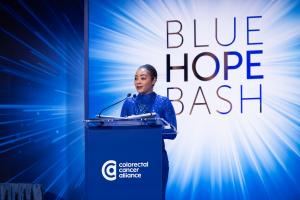
Colorectal Cancer Alliance Survey Reveals Disparities in Minorities that Could Increase Colorectal Cancer Risk
Alliance Advocates for Greater Awareness during April Minority Health Month
The survey found that these minority groups are significantly less aware that colorectal cancer is often not detected until the late stages due to mild symptoms—just 35% of Black adults and 38% of Hispanic adults recognize this as true, compared to 52% of white adults. Additionally, only 29% of Black adults and 36% of Hispanic adults understand that colorectal cancer is one of the most preventable cancers, compared to 46% of white adults. This lack of knowledge can be deadly, especially with Hispanics and Blacks already at a higher risk for the disease.
“Lack of awareness is a key factor in delaying potentially life-saving screening,” said Michael Sapienza, CEO of the Colorectal Cancer Alliance. “As the leading nonprofit dedicated to ending this disease, the Alliance is committed to spreading education among underserved communities and breaking down barriers to timely screening.”
Beyond awareness, familiarity with colonoscopy procedures also varies widely. While 79% of white adults know that a colonoscopy involves inserting a camera into the body to examine the colon, only 53% of Black adults are aware. Similarly, 52% of Black adults understand the need for a day of preparation, compared to 75% of white adults. Alarmingly, nearly a quarter (23%) of Black adults incorrectly believe a colonoscopy requires an inpatient hospital stay—potentially contributing to the 36% of those not already committed to getting screened who report fear could keep them from doing so. Hispanic adults showed the highest knowledge gap when deciphering colonoscopy myths and facts, with 34% answering three or more statements incorrectly, higher than white (23%) and black (23%) adults.
Medical recommendations also show stark disparities. A staggering 58% of Black adults and 51% of Hispanic adults have never had a doctor recommend colorectal cancer screening, compared to 36% of white adults. Yet, the good news is that among those who have not yet been screened, 49% of Black adults are committed to doing so at age 45 or within the next year—more than double the percentage of white adults (23%). And while only 27% of white adults would rather get a colonoscopy than file their taxes, 38% of Hispanic adults and 43% of Black adults would choose the colonoscopy. Hispanic adults (60%) are the most likely to say they can never seem to find the time for health screenings like those for colorectal cancer. However, 43% could be convinced to get a colonoscopy if they received a day off from work or childcare, which is higher than white (24%), and black (34%) adults.
By normalizing the conversation around colorectal cancer through initiatives like LEAD FROM BEHIND, addressing common misconceptions, and providing accessible tools, the Alliance is working to close these critical awareness gaps and save lives. The Alliance offers support and information about colorectal cancer risk factors, symptoms, and screening options, as well as a free personalized screening recommendation in both English and Spanish at getscreened.org.
About the Colorectal Cancer Alliance
The Colorectal Cancer Alliance empowers a nation of passionate and determined allies to prevent, treat, and overcome colorectal cancer in their lives and communities. Founded in 1999 and headquartered in Washington, D.C., the Alliance advocates for prevention through initiatives like LEAD FROM BEHIND, magnifies support with BlueHQ, and accelerates research through Project Cure CRC. We are the largest national nonprofit dedicated to colorectal cancer, and we exist to end this disease in our lifetime. For more information, visit colorectalcancer.org.
Methodology: The Colorectal Cancer Alliance Survey was conducted by Wakefield Research among 1,000 nationally representative U.S. adults ages 18+
Emily Blasi
Colorectal Cancer Alliance
+1 202-971-9964
email us here
Visit us on social media:
Facebook
X
LinkedIn
Instagram
YouTube
TikTok
Distribution channels: Culture, Society & Lifestyle, Education, Healthcare & Pharmaceuticals Industry, Media, Advertising & PR, Science
Legal Disclaimer:
EIN Presswire provides this news content "as is" without warranty of any kind. We do not accept any responsibility or liability for the accuracy, content, images, videos, licenses, completeness, legality, or reliability of the information contained in this article. If you have any complaints or copyright issues related to this article, kindly contact the author above.
Submit your press release
